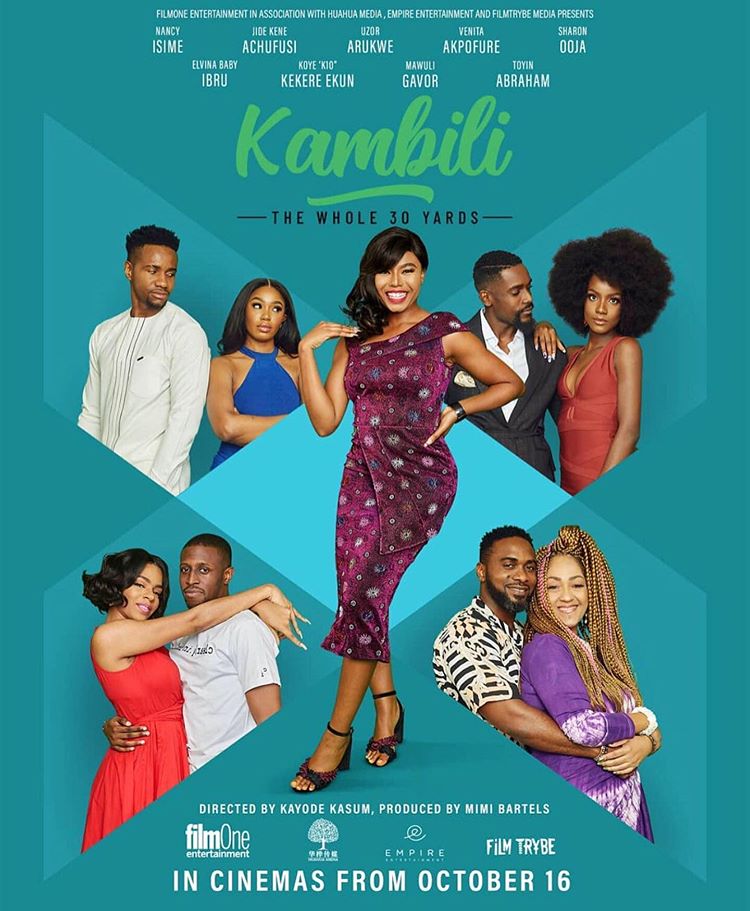Features
Oris Aigbokhaevbolo: Nancy Isime Learns that Love is Hard Work in “Kambili: The Whole 30 Yards”
 There is a subtle shift in modern Nollywood romantic comedy from family to work. Well, maybe it’s not a shift but an expansion. For many years, the most important thing in the life of a heroine was the family: her mother urging her to get married or her potential in-law hassling her about the quality of her wife material.
There is a subtle shift in modern Nollywood romantic comedy from family to work. Well, maybe it’s not a shift but an expansion. For many years, the most important thing in the life of a heroine was the family: her mother urging her to get married or her potential in-law hassling her about the quality of her wife material.
As the economy has dwindled and entrepreneurship and intrapreneurship dominate work discourse, Nollywood is taking notes. A few years ago, In The Wedding Party, it was the family unit blocking marital happiness. In the new film, Kambili (subtitled, The Whole 30 Yards), the obstacle to marital bliss is work, or rather, the heroine’s resistance to work. She’s the opposite of Isoken‘s character whose mother lamented how “work, work, work” was holding her back from marriage.
By contrast, Kambili (Nancy Isime) arrives at work late, her house is in disarray, and she hasn’t met a designer shoe she didn’t immediately buy. To top it off, her rent is late. You can imagine films from a different time and climate setting these up as quirks that might make some straitlaced guy love her. Not in this economy.
In a matter of scenes, she’s tossed out of a relationship by her boyfriend, John (Mawuli Gavor). His reason is that she isn’t, to use fancy jargon, self-optimising. He’s the romantic equivalent of a coach that comes to see that his athlete will never be elite and isn’t the type to tolerate slackers. So out she goes. To get back into the game, she realizes that she needs to become pro-capitalism – that is, prove that she can work and if that works out, love will return. In other words, the breakup brings a lesson to her: capitalism is house, and house always wins. Luckily, she has a group of supportive friends, the overburdened Chidi (Jidekene Achufusi), Jesse (a semi-miscast Koye Kekere-Ekun as a semi-lacklustre guy), and Biodun (a surprisingly effective Venita Akpofure). A needless subplot involving Jesse and Biodun as a married couple is the film’s only misjudgment.
As I hope that abbreviated synopsis hopefully makes clear, Kambili is a typical rom-com that is colourfully told. It is well-handled by Director Kayode Kasum who seems particularly taken in by comic stories. In a career that has seen one unfortunate picture, Dognapped, and Sugar Rush, an otherwise decent comedy ruined by its last quarter of an hour, Kambili is a highlight.
Filmed bright and light by Adeoluwa Owu and Emmanuel Igbekele, Kambili is fun and often funny, thanks to Ozioma Ogbaji’s worthy screenplay. The film aims for cool, non-abrasive humour and nails it. There’s a scene featuring Isime and Gavor talking in a car that is cliched because anyone can smell how it would end, but the brutally frank words spoken with conviction by Gavor are so good that I think Ogbaji should write every line of dialogue for tense romantic scenes involving the Ghanaian actor. If Gavor is going to be forever typecast as the handsome, chiseled-jaw boyfriend who is a douchebag, let him have a screenwriter who will put the right douchery in his mouth.
For her part, Isime is well-case as the film’s lead. I have seen movies dealing in romance where you struggle to understand the attraction to a female character by several male characters, but that’s not remotely the case here. The way the camera captures Isime’s face and the way she moves ensures that the viewer sees her in the exact way the characters see Kambili: whatever her flaws, none of it is connected to her physicality. In one lovely scene, a male character opens a door to reveal Kambili within the frame, lipstick expertly lined on her lips, her hair curled and catching light, a soft glow on her cheeks. With a little more compositional thought from the director and his cinematographers, that shot would launch a thousand wallpapers. It’s still a decent shot but I couldn’t help thinking that what is merely beautiful could have been absolutely irresistible.
As with a bunch of comedy films released (and to be released) this season, the viewer is likely to guess what would become the film’s final configuration of lovers and would-be lovers. After all, filmmaking has guidelines for romantic comedies. But suspense isn’t the most prized feature of rom-coms of this sort, so you are unlikely to feel deflated even if you predict it correctly. What you might feel is a certain kind of joy at a group of actors hitting the right crowd-pleasing notes.
My final grade: B+



















